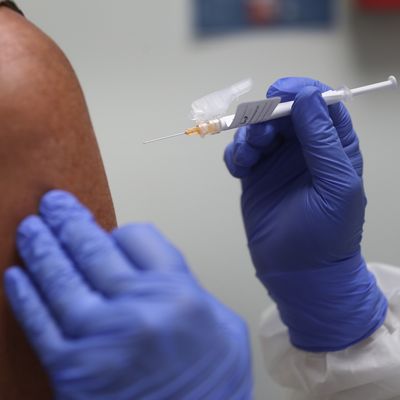
When I asked Dr. Marta Perez this week what taking the COVID-19 vaccine would mean for her, she had to pause. “I’ve started getting choked up even thinking about it,” she said. Perez is a laborist at a hospital in St. Louis, Missouri, which means she delivers babies all day in a state with soaring rates and no mask mandate, where some of her patients have been severely ill. She’s also 33 weeks pregnant, which means she and her husband — a pediatric ICU doctor who cares for kids with COVID-19 — have had to talk about care plans for their future child if one or both of them become critically ill.
Over the summer, Perez told me, anti-vaxxers swarmed her social media with death threats and called her employer because she said on her popular Instagram and YouTube accounts that pregnant and lactating people should have been included in the initial COVID-19 vaccine research. Unbowed, a week ago, Perez posted a video that examined the tradeoffs for pregnant people considering vaccination — on the one hand, no data on safety of these particular vaccines for them, and on the other hand, the known risk of more severe COVID-19 — and declared, “I look forward to getting the vaccine. I’m personally gonna get it if it’s available while I’m pregnant, but I’ll definitely get it when I’m hopefully breastfeeding.” On the phone, she said she hoped being visible and outspoken would help counter vaccine hesitancy. “Seeing a photo of me with my pregnant belly and my scrubs on will hopefully be a powerful message,” she said.
The question is whether Perez will have the opportunity to get the vaccine at all. None of the vaccines hurtling toward FDA approval have been tested on pregnant people, so there is no affirmative safety data, though that doesn’t necessarily mean the vaccine is harmful. In the next few days, the FDA and the CDC will issue crucial approvals and recommendations around Pfizer’s vaccine, with other vaccines soon to follow. Much depends on how these federal agencies talk about pregnancy and breastfeeding — in particular for the pregnant and lactating health-care workers who will be the very first to decide whether to vaccinate. It’s not a small group. According to the CDC, 75 percent of the health-care workforce is female and about 330,000 health-care workers “could be pregnant or recently postpartum at time of vaccine implementation.” And while some pregnant women have mild cases when they contract coronavirus, according to the CDC, “data demonstrate potentially increased risks of severe maternal illness and preterm birth due to COVID-19 disease.”
Last spring was marked by shifting policies around pregnancy and COVID-19, as medical professionals scrambled to understand the virus; for pregnant people, the vaccine rollout seems headed for a similarly confusing trajectory. Already, medical advice has ranged from essentially barring pregnant women from the vaccine, to saying they, especially health-care workers and high-risk individuals, shouldn’t be blocked from opting in, to outright recommending it for pregnant women.
The FDA’s counterpart in the U.K., where vaccinations are already underway, has effectively banned pregnant or breastfeeding people from getting the vaccine, and even added that anyone getting the vaccine should be “advised to avoid pregnancy for at least two months after their second dose.” On Wednesday, three Johns Hopkins experts on pregnancy and vaccination urged the FDA to be more flexible than their British peers, at least when it came to health-care providers. “In the absence of pregnancy-specific data, we agree that it is premature to recommend that pregnant and lactating individuals should be offered the vaccine,” they wrote in STAT News. “As the FDA develops its position, we urge it to consider more permissive language that acknowledges information gaps but still permits some high-risk pregnant or lactating individuals to get the vaccine.” And three Duke experts on pregnancy, including one who was a co-investigator on Pfizer’s trial, published a paper in the American Journal of Obstetrics and Gynecology-MFM, saying it would be “unethical” to withhold the vaccine from pregnant people.
The Society of Maternal Fetal Medicine has gone further still. Having long advocated for more clinical research to include pregnant and lactating people, the organization put out a statement concluding, “In general, SMFM strongly recommends that pregnant women have access to COVID-19 vaccines in all phases of future vaccine campaigns, and that she and her healthcare professional engage in shared decision-making regarding her receipt of the vaccine.” The group adds, “Furthermore, there is no biological plausibility for the exclusion of lactating women from these trials.” (According to the CDC’s guidance on breastfeeding and COVID-19, “current evidence suggests that breast milk is not a likely source of infection.”)
Dr. Judette Louis, the society’s president and an expert in high-risk pregnancies, told me that her task force had looked at the actual risks to pregnant people from contracting the coronavirus — “you’re more likely to end up in the intensive-care unit, and you’re more likely to die compared to people the same age who aren’t pregnant” — versus the theoretical risks of the vaccine. “We’re left looking at the technology. What do we know about the technology that’s used? Are there others that have a similar profile?” While mRNA vaccines like Pfizer’s and Moderna’s have not been given to pregnant and lactating people, “AstraZeneca’s use of a viral-vector is similar to the mechanism used in the Ebola vaccine,” the SMFM statement notes, “which has been administered during pregnancy and thus far has an acceptable safety profile.”
Pregnant women are already encouraged to get flu vaccines and whooping-cough boosters, while discouraged from vaccines that use live virus — the measles, mumps, and rubella vaccines, for example. “The COVID ones do not use live vaccine,” said Louis. “There is no basis for the fears.”
Dr. Geeta Swamy, the co-author of the ACOG-MFM paper who also was a co-investigator for the Pfizer vaccine trial, points out that, though there is unique scrutiny on this vaccine, medical recommendations in general, and in pregnancy in particular, are often made on the basis of limited data. The vaccines that pregnant women do get — for the flu and whooping cough — never went through randomized control trials for pregnancy in particular, but rather were recommended on the basis of existing data.
Why haven’t pharmaceutical companies created concurrent trials for pregnant people? “The problem is that we’re in a pandemic, and everyone has been racing to get a vaccine that works,” Swamy said. In record time, researchers have gone through the phases of clinical trials — starting with a small number of people to figure out dosage, then a slightly larger group, then the largest one, Phase Three, with half the population receiving a placebo. “All the companies in the beginning said, ‘We’ll do studies in pregnancy, but not until Phase Three is done,’” said Swamy. Plus, for pregnancy, the FDA requires additional data on pregnant animals receiving the vaccines — all of which Swamy thinks the companies should have started doing earlier.
Louis believes — and she’s not alone — that the lack of data is a form of paternalism that prioritizes the fetus over the pregnant person. “I wish someone would collect data about what proportion of people who are pregnant suffered harm between when the vaccine was available and when there was available data on pregnant people,” Louis said. “That’s the piece that’s always missing. Everyone’s focusing on this theoretical risk to the baby, but what’s the harm we get in delaying access to the vaccine?”
Some data will eventually come: Pfizer has sent out notices recruiting sites to administer vaccines, and Johnson & Johnson is believed to be including pregnant women in their next round of trials. The CDC is funding Swamy’s research at Duke on immunizing pregnant women if they are allowed to receive the vaccine. But results could be months away.
Louis anticipates that cautious language from the FDA in approving the Pfizer vaccine will mean pregnant and lactating people won’t receive it. “By saying it’s not approved for certain populations, it puts those who would administer the vaccine in a position where they risk repercussions if they violate that,” she said. “In effect it’s banning it.”
It’s possible that the CDC’s Advisory Committee on Immunization Practices (ACIP) will recommend otherwise. A nonvoting member of the committee, representing the National Foundation for Infectious Diseases, told Reuters that the panel may well allow the pregnant and lactating to be vaccinated if they are fully informed about risks and benefits.
The American College of Obstetricians and Gynecologists has yet to issue guidelines on what providers should counsel their patients — or do themselves — but they’ve been noticeably cautious. “There isn’t a simple answer to questions about whether pregnant people, or those considering pregnancy, should take the COVID-19 vaccine,” Christopher Zahn, M.D., ACOG’s vice-president of Practice Activities, said in an emailed statement. “Certainly the lack of safety and efficacy data will need to be part of the conversation that patients who are pregnant or considering pregnancy will need to have with their obstetrician-gynecologist or other health-care professional.”
If the Society of Maternal Fetal Medicine is more willing to go out on a limb, Louis told me, it’s because its members see the highest-risk patients, many of the same ones who might be at greatest risk to coronavirus complications. “Part of what we’re advocating for is that there should be a shared decision making discussion,” Louis said. “What’s important to one person might not be the same as for another — for someone who is 21 and healthy, they might have a low risk of progressing to serious disease. But if I have someone with high risk conditions associated with disease, or if they can’t socially distance, that changes the equation. What we’re doing in not offering it is we’re not offering them the opportunity to make the decision for themselves.”
On Wednesday afternoon, Perez was beginning to worry that she wouldn’t be able to be vaccinated after all. She had just finished a webinar at the medical school where she teaches obstetrics and gynecology. “They went over the fact that there aren’t really any theoretical risks,” she said. “But they did say that they’re going to follow what the FDA says and go by that.”
She was disappointed. “If I were living on an island by myself without any visitors I would not be concerned about any of this,” she said, “but as a health-care worker I’m exposed all the time to COVID.” Perez still holds out hope that advocacy might move the needle (literally), starting right now: “I sent a message through the chat function and said, ‘I would encourage you to give pregnant people the ability to choose.’”
This is a developing story and will be updated.






























